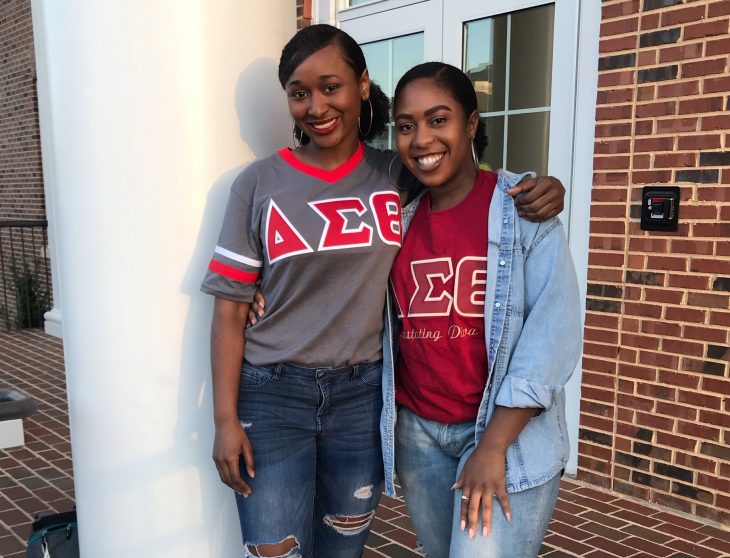Through Elon’s oldest peer-mentoring program, Student Mentors Advising Rising Talent, the Center for Race, Ethnicity & Diversity Education connects students and helps them find community, guidance and belonging.
Akani Bey ’24 is honest about it — the transition from life in New York City to life as a first-year Honors Fellow at Elon has been a challenge. He’s missed the culture, his friends and the broad diversity he knew in the city. Elon’s campus is another world, and Bey wasn’t sure where he could find his place and a comfortable community in his new home.
In September, he took his parents’ advice and enrolled in the SMART Mentoring Program, a peer-to-peer program that supports and connects students who identify as African American/Black, Latino/Hispanic, Asian/Pacific Islander, Native American, Alaskan Native and Multiracial (ALANAM). The program paired him with mentor Madison Holmes ’22, and that relationship has made a big difference for Bey.
“My favorite experience I’ve had here at Elon is when Madison introduced me to a group of Black Elon students,” Bey said. “It was my first time being in a Black environment here, and I met friendly people that related to me. I had long discussions about ethnicity and culture with people that relate to the subjects, and I could hear music from various parts of the African diaspora. It was a great experience that I hope to have again.”
SMART, which stands for Student Mentors Advising Rising Talent, is Elon’s oldest peer-mentoring program. L’Tanya Richmond ’87 founded it in 1994 while she was serving as the director of the Office of Minority Affairs, and it’s a key initiative of Elon’s Center for Race, Ethnicity & Diversity Education (CREDE). This academic year there are around 60 students participating and 35 first-year students being mentored.
The SMART program provides an opportunity for ALANAM students to build intentional relationships with one another through small-group mentorship and larger social gatherings and events with all of the participants. The COVID-19 pandemic has forced them to incorporate more virtual events this year, but the pairs of mentors and mentees are still meeting in person to share meals, conversation and resources.
John Robinson-Miller IV, assistant director of the CREDE, is the program’s coordinator. He said that the mentors are knowledgeable about on-campus resources and programming, and they’re also trained to facilitate difficult conversations with mentees about racial difference and belonging. They can share their experiences in areas like research, leadership and study abroad.
“Navigating the secondary curriculum of a predominately white institution is incredibly challenging to students of color,” said Robinson-Miller. “There are barriers to negotiate academically and socially. They often do not have the opportunity to see themselves reflected in their classrooms or while navigating campus if they do not intentionally seek out spaces.”
Bey’s mentor Madison Holmes said he definitely experienced what Robinson-Miller describes in his first year at Elon. Holmes was not part of SMART that year but said he wishes he had been. Remembering how that period felt for him and recognizing the additional social challenges related to beginning college during the COVID-19 pandemic, he decided to join as a mentor this year.
“I wanted to be that liaison, someone who looks like their mentee,” Holmes said. “At Elon there are not a lot of minorities, and I want to help and be there to talk to about whatever is going on.”
Although he’s in the mentor role, Holmes said participating in SMART is not a one-way street. He’s learning, too.
“When Akani was in high school, he did a lot of environmental work abroad, in the Caribbean and South America,” Holmes said. “He’s taught me about the cultures in those regions. He’s got friends from that part of the world, but it’s new to me.”
The program doesn’t necessarily pair students based on similar interests, and Bey and Holmes have discovered they have some differences. But the differences haven’t been a barrier, and the two have developed fellowship and shared meaningful conversations.

Jewel Tillman ’21 joined SMART as a first-year student, and it’s been a positive force her entire time at Elon. During her first semester, she and her mentor, Janay Tyson ’19, met and began to cultivate what remains a deep friendship. Her sophomore year, Tillman transitioned to being a mentor herself, and now she’s a SMART student coordinator, helping with program development and pairing new mentors and mentees.
“SMART taught me how to navigate Elon as a Black woman,” Tillman said. “It’s very different for a person of color than a white student. The program helped me understand what isn’t spoken about Elon. How to react when you’re the only person in class who’s Black. What to do when someone calls you a slur.”
In addition to her mentor, SMART also connected Tillman with other students who’ve created a group chat, which functions as a support network. These peer-to-peer chat conversations have been especially helpful through this unusually stressful fall semester. When people in the group are feeling uncomfortable or experiencing problems, they can turn to the group for help. In that space they’re able to communicate openly and honestly about how they’re feeling and what they’re experiencing.
“It’s been bringing us together and showing our resilience,” Tillman said. “I don’t want to deal with everything on my own, and I appreciate having a community where we look out for one another. Without SMART I wouldn’t have been as successful here at Elon. It’s fundamental for my emotional and mental health.”



